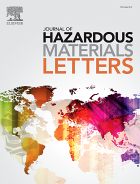|
Literature / Source Database:
Journal of Hazardous Materials Letters
Description
a partner title to the highly-regarded Journal of Hazardous Materials, is a new online only, open access, peer reviewed journal.
| Title (short) |
J. Hazard. Mater. Lett. |
| Languages |
English |
| First year |
2020 |
| Impact factor |
6.6 |
|
|

|
Status
active
Subject

Source type
Journal
Publisher
E ISSN
2666-9110
First volume
1
Last volume
6+
Homepage
| Resources |
|
Availability |
|
|
|
|
|
| Text PDF |
 |
free access |
 |
| Text Html |
 |
for subscriber |
 |
| References |
 |
not available |
 |
| Abstracts |
 |
|
|
| TOC |
 |
|
|
|
|
|
|

Description
The Journal of Hazardous Materials Letters ( JHM Letters) publishes research articles with exceptional importance and immediate impact, and frontier reviews highlighting state of the science and emerging issues to improve our understanding of the hazards and risks that certain materials pose to public health and the environment. JHM Letters is an international journal that accepts papers that deal with ways of assessing the impact and mitigation of the effects of hazardous materials (HM) and contaminants of emerging concern (CECs), especially papers with global significance and implications. JHM Letters aims to provide rapid and rigorous review of papers to allow immediate publication of scientific data in an open access format. The selection of a paper will involve initial screening, internal evaluation, and external peer review. The Journal publishes novel and high-impact contributions on: Characterization of the Harmful Effects of HM and CECs Advances in Measurement and Monitoring Transport and Fate in Environment Impact Assessment and Mitigation Physio-chemical Treatment and bioremediation Demonstrated Safer and Cleaner Technologies with minimization of deleterious effects of HM Resource Recovery (Energy and Materials) from HM with reduction of their hazardous effects
However, the following areas are excluded: Non-hazardous materials Work place health and safety Municipal wastewater treatment research focusing on the removal of regular organic and nutrient compounds Greenhouse gas mitigation Manufacturing of explosives Fire/flame and/or flame retardants that do not focus on hazardous effects of the materials Environmental epidemiology
|